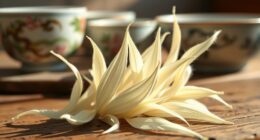Are you an enthusiast of tea in search of a revitalizing and healthy beverage that provides a boost of energy? If that’s the case, you may have come across the benefits of turmeric tea.
This golden elixir has been praised for its anti-inflammatory and antioxidant properties, as well as its ability to boost brain function and improve digestion. But what about caffeine?
How much caffeine is in turmeric tea, and is it safe to consume? Before we dive into the details, let’s start with a common saying: ‘a little knowledge is a dangerous thing.’
This means that having just a superficial understanding of a topic can lead to mistakes and misunderstandings, especially when it comes to health and nutrition. Therefore, it’s important to learn the facts about turmeric tea and caffeine, so that you can make informed decisions about your diet and lifestyle.
So, let’s get started!
Key Takeaways
- Turmeric tea has negligible caffeine content.
- The amount of caffeine in tea can vary depending on factors such as brewing method and brand.
- Caffeine intake should be monitored as consuming too much can have negative effects such as anxiety, insomnia, and heart palpitations.
- Incorporating turmeric tea may improve overall health and well-being, but it’s important to understand the facts about turmeric tea and caffeine for informed decisions.
What is Turmeric Tea?
If you’re looking for a warm and soothing beverage that’s also packed with health benefits, turmeric tea might just be your new go-to. This flavorful tea is made by steeping turmeric root in hot water, and it’s been used in traditional Ayurvedic medicine for centuries due to its anti-inflammatory and antioxidant properties.
Health benefits of turmeric tea include improved digestion, reduced inflammation, and lowered risk of chronic diseases like cancer and heart disease.
When it comes to brewing methods, there are a few different options depending on your preferences. Some people like to simply steep fresh or dried turmeric root in boiling water, while others prefer to add other spices like ginger or cinnamon for added flavor and health benefits. You can also find pre-made turmeric tea bags at many health food stores if you’re short on time.
Regardless of how you prepare it, turmeric tea is a great way to reap the benefits of this powerful spice. Now, let’s dive into understanding caffeine and how much is in turmeric tea.
Understanding Caffeine
Exploring the world of coffee, one might say that caffeine is the fuel that keeps the engine running. Caffeine is a natural stimulant that affects the central nervous system, and it is found in a variety of foods and drinks, including tea, coffee, and chocolate.
When consumed, caffeine stimulates the brain, increases heart rate, and boosts energy levels. However, it can also have negative effects on the body, such as causing anxiety, insomnia, and heart palpitations.
It’s recommended that adults consume no more than 400 milligrams of caffeine per day, which is roughly equivalent to four cups of coffee. This amount is considered safe for most people and can provide the benefits of increased alertness and concentration without causing negative side effects. However, it’s essential to note that caffeine affects everyone differently, and some people may be more sensitive to its effects than others. It’s always best to listen to your body and understand your limits when it comes to caffeine intake.
As for how caffeine content is measured, it depends on the type of drink. In coffee, the caffeine content can vary depending on factors such as the type of bean, the roast, and the brewing method. Similarly, in tea, the caffeine content can vary depending on the type of tea, the processing method, and the brewing time.
In the next section, we’ll explore how much caffeine is in turmeric tea and how it’s measured.
How Caffeine Content is Measured
You may be surprised to learn how caffeine content is measured in your favorite drinks. The process of measuring caffeine content involves caffeine extraction from the drink sample and analysis through a high-performance liquid chromatography (HPLC) machine.
This method involves dissolving the drink sample in an organic solvent and passing it through a column filled with a stationary phase. The caffeine molecules in the sample will then interact with the stationary phase and separate from other components in the sample. The separated caffeine molecules are then detected and quantified by the HPLC machine, which measures the amount of caffeine present in the sample.
It is important to note that caffeine sensitivity varies from person to person. Some people may experience the effects of caffeine after consuming small amounts, while others may require larger quantities to feel the same effects.
Additionally, caffeine content in drinks can vary depending on factors such as brewing method, water temperature, and brand. This is why it’s important to be aware of the caffeine content in your favorite drinks, especially if you have a low caffeine tolerance.
Speaking of which, let’s explore how much caffeine is in turmeric tea.
Caffeine Content in Turmeric Tea
Get ready to learn about the amount of energy boost you can expect from sipping on a cup of turmeric tea. Although turmeric tea is known for its many health benefits, it is not a significant source of caffeine. The amount of caffeine in turmeric tea is negligible, with only trace amounts present. This means that turmeric tea can be a great alternative to traditional caffeinated beverages for those who are sensitive to caffeine or looking to reduce their caffeine intake.
To give you a better idea of the caffeine content in turmeric tea, here is a table comparing the caffeine levels in turmeric tea to other common beverages:
| Beverage | Caffeine Content (mg) |
|---|---|
| Turmeric Tea | Negligible |
| Decaf Coffee | 2-5 |
| Green Tea | 20-45 |
| Black Tea | 47-90 |
| Coffee (8 oz) | 95-200 |
As you can see, turmeric tea is essentially caffeine-free. While caffeine can provide a quick energy boost, it can also lead to jitters, anxiety, and disrupted sleep. With the many benefits of turmeric tea, including its anti-inflammatory properties and ability to boost brain function, it is a great choice for those looking for a natural way to improve their health without the negative effects of caffeine.
Moving on to the next section, let’s explore the factors that can affect the caffeine levels in turmeric tea.
Factors Affecting Caffeine Levels in Turmeric Tea
Now let’s dive into what can impact the buzz you get from sipping on a cup of golden elixir, and how you can tailor your turmeric tea to your preferred level of energy. The caffeine content in turmeric tea can vary depending on several factors, including the brewing methods and processing techniques used.
Here are some things to consider:
-
Brewing methods: The longer you steep your turmeric tea, the higher the caffeine content will be. If you’re looking for a caffeine boost, consider steeping your tea for a longer period of time. On the other hand, if you want to reduce your caffeine intake, try brewing your tea for a shorter amount of time.
-
Processing techniques: The way that turmeric tea is processed can also impact its caffeine content. Some brands and varieties may have a higher caffeine content due to the way that the tea leaves are treated during processing. If you’re concerned about caffeine levels, look for teas that are minimally processed.
-
Type of tea: The type of tea used in your turmeric tea blend can also impact caffeine levels. Black tea, for example, has more caffeine than green tea or herbal teas. If you’re looking for a caffeine-free option, consider using a caffeine-free herbal tea as the base for your turmeric blend.
-
Amount of tea used: Finally, the amount of tea used can also impact caffeine levels. If you want to reduce your caffeine intake, try using less tea when brewing your turmeric tea.
Now that you know more about what can impact the caffeine content in your turmeric tea, let’s explore the many benefits of this delicious and healthy beverage.
Benefits of Turmeric Tea
Sipping on a cup of this golden elixir can provide numerous health benefits, including anti-inflammatory properties and aiding in digestive health. Turmeric, the primary ingredient in turmeric tea, is known for its anti-inflammatory properties that can help reduce inflammation in the body. This can be especially beneficial for those with arthritis or other inflammatory conditions.
Additionally, turmeric can aid in digestive health by reducing gas and bloating and promoting healthy gut bacteria. Not only is turmeric tea a delicious and soothing beverage, but it can also provide a multitude of health benefits. Incorporating turmeric tea into your daily routine may help improve your overall health and well-being.
However, it’s important to keep in mind that consuming too much caffeine can have negative effects on the body. Let’s explore the risks of consuming too much caffeine in the next section.
Risks of Consuming Too Much Caffeine
You may want to consider limiting your intake of turmeric tea as it contains caffeine, which can pose certain risks to your health if consumed in excess. While caffeine can provide temporary boosts in energy and mental alertness, excessive consumption can lead to negative health effects such as anxiety, insomnia, and high blood pressure.
In fact, consuming more than 400 milligrams of caffeine per day can have adverse effects on your health. The recommended intake of caffeine for adults is 200-300 milligrams per day, which is roughly equivalent to one to two cups of coffee.
If you’re looking to limit your caffeine intake, there are alternative caffeine-free beverages you can enjoy, such as herbal teas, sparkling water, or fruit-infused water. With moderation and awareness of the potential health effects of caffeine, you can still enjoy turmeric tea as part of a healthy and balanced diet.
Alternative Caffeine-Free Beverages
There are plenty of delicious caffeine-free beverage options to choose from, such as herbal teas, sparkling water, or fruit-infused water. These alternatives can provide a refreshing and healthy boost without the jitters or crashes associated with caffeine.
Herbal teas are a popular choice for those looking to cut back on caffeine. There’s a wide variety of flavors and benefits to choose from, such as chamomile for relaxation, peppermint for digestion, or ginger for anti-inflammatory properties.
Fruit-infused water is another great option, providing a natural sweetness without added sugars. Simply add your favorite fruits, such as strawberries, lemon, or cucumber, to a pitcher of water and let it infuse for a few hours.
With so many tasty and healthy options available, it’s easy to find a caffeine-free beverage that you’ll love.
Frequently Asked Questions
Can turmeric tea be consumed during pregnancy?
While turmeric tea has many benefits, consuming it during pregnancy can pose risks. It is best to avoid it or consult with a healthcare professional. For women with liver problems, there are alternative teas and precautions to consider.
Is it safe to consume turmeric tea if one has a history of liver problems?
If you have a history of liver problems or take medication, consult your doctor before consuming turmeric tea. While it’s generally considered safe in moderation, it may interact with certain medications and affect liver health.
Does the caffeine content in turmeric tea vary based on the region it is sourced from?
Regional variations in cultivation methods can affect the quality control and caffeine levels of turmeric tea. However, there is no evidence to suggest that the caffeine content varies based on the region it is sourced from.
Can turmeric tea be consumed at night without disrupting sleep?
Turmeric tea has numerous benefits, including anti-inflammatory properties and improved digestion. However, it may cause sleep disruption due to its caffeine content. Alternatives like chamomile or lavender tea can be consumed at night without drawbacks or comparisons.
Are there any potential side effects of consuming turmeric tea regularly?
Regular consumption of turmeric tea is generally safe, but potential risks include stomach upset and blood thinning. Recommended dosage is 1-3 grams of turmeric per day. Caffeine content is negligible.
Conclusion
Congratulations! You’ve made it to the end of this article on caffeine in turmeric tea. You now know that turmeric tea, like most herbal teas, has little to no caffeine. But wait, there’s more!
While turmeric tea may not provide the caffeine boost you were hoping for, it does offer a range of health benefits. So, if you’re looking for a caffeine-free alternative to coffee or black tea, turmeric tea is definitely worth a try. Who needs caffeine when you have the power of turmeric on your side?
In conclusion, while caffeine may be a popular stimulant, it’s not the only way to boost your energy or improve your health. So, go ahead and enjoy a cup of turmeric tea and reap the benefits of this golden elixir without worrying about caffeine jitters.
Remember, sometimes less is more!










